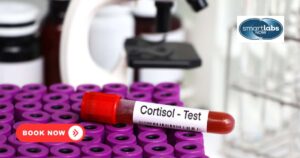
Cortisol is a vital hormone that regulates metabolism, blood sugar, inflammation, and stress responses.
Testing cortisol levels helps diagnose conditions like Cushing’s syndrome and Addison’s disease, ensuring proper treatment for hormone imbalances.
Whether you need a serum, saliva, or urine test, Smart Labs Now in Portland, Oregon, provides quick and accurate cortisol testing services.
Get Your Cortisol Levels Checked Today!

A cortisol test measures the body’s stress hormone levels, crucial for:
Ensuring proper hormone production.
Balancing energy use and reducing inflammation.
Identifies abnormal cortisol regulation.
Used alongside lab tests to detect adrenal or pituitary disorders.
Provides flexibility in monitoring cortisol fluctuations.
This 2024 study by Shannon Gerow, MSN, FNP-C, provides a comprehensive overview of cortisol testing, including its purpose and procedures.

Cortisol testing helps diagnose and monitor adrenal and pituitary disorders.
Confirms overactive or underactive adrenal glands.
Detects life-threatening conditions requiring urgent treatment.
Evaluates hormone regulation affecting cortisol production.
ACTH stimulation and dexamethasone suppression tests determine adrenal function.
Offers convenient monitoring of daily cortisol patterns.
This 2024 study by Shannon Gerow, MSN, FNP-C, discusses the significance of cortisol testing in evaluating adrenal function and diagnosing related disorders.

There are several ways to measure cortisol levels, each providing insights into adrenal gland function and stress response.
Conducted in the morning when cortisol levels are highest, requiring a blood sample from a vein.
Measures free cortisol levels at night to check for abnormal fluctuations.
Collects urine samples over 24 hours to assess cortisol production throughout the day.
Evaluates how the body suppresses cortisol after taking dexamethasone.
Laboratory methods to measure cortisol levels precisely.
Convenient options for monitoring cortisol fluctuations over time.
Cortisol testing follows a structured procedure based on the test type.
The process ensures accurate measurement of cortisol levels to aid in diagnosing potential health issues.
Below are the key steps for different types of cortisol tests:
Each method provides valuable insights into cortisol fluctuations and adrenal function.
Choosing the appropriate test depends on the specific diagnostic needs recommended by a healthcare provider.
This 2024 study by Shannon Gerow, MSN, FNP-C, outlines various methods for measuring cortisol levels, including blood, urine, and saliva tests.

To ensure accurate cortisol measurements:
Depending on the test type, different preparations may be necessary.
Some tests require fasting or avoiding food before sample collection.
Blood tests are often done early due to natural cortisol fluctuations.
Exercise impacts cortisol levels and may skew results.
Relaxation and rest are recommended to avoid cortisol spikes.
Nervousness can elevate cortisol; consider deep breathing techniques.

Several factors can impact cortisol test accuracy:
Steroid hormones, oral contraceptives, and glucocorticoids can alter cortisol levels.
Heart conditions, Addison’s disease and Cushing’s syndrome significantly affect cortisol production.
Stress, age, gender, and strenuous activity influence test outcomes.
Lab variations and sample type (blood, saliva, or urine) may cause differences in results.

Understanding cortisol levels helps diagnose potential health concerns:
Typically measured in micrograms per deciliter (mcg/dL), with reference values varying by test type.
May indicate Cushing’s syndrome, stress disorders, or excessive steroid use.
Could signal Addison’s disease, adrenal insufficiency, or pituitary dysfunction.
Free cortisol represents active levels, while protein-bound cortisol remains inactive.
Your healthcare provider will compare results to established reference ranges for diagnosis.
Recognizing high or low cortisol levels can help identify health issues:
Weight gain, high blood pressure, fatigue, muscle weakness.
Extreme fatigue, low blood pressure, unexplained weight loss.
Tumors and steroid medications can disrupt hormone balance.
Chronic stress contributes to abnormal cortisol production.
While generally safe, cortisol tests have minor risks:
Understanding cortisol testing can help individuals make informed decisions.
Here are some of the most commonly asked questions:
Ans: At-home cortisol test kits provide a convenient way to measure cortisol levels using saliva or urine samples.
While they can offer useful insights, their accuracy depends on proper sample collection and laboratory analysis. Consulting a healthcare provider for interpretation is recommended.
Ans: Cortisol levels naturally fluctuate throughout the day, typically peaking in the morning and declining at night.
Factors such as stress, sleep patterns, and medical conditions can also impact these levels.
Ans: Lab-based cortisol tests, including blood, urine, and saliva tests, are highly accurate when performed correctly.
However, variations in sample collection, test timing, and laboratory techniques can influence results.
Ans: Cortisol tests are widely available at medical labs, hospitals, and specialized diagnostic centers. At-home test kits can also be purchased online or from pharmacies.
Ans: The cost varies depending on the type of test, lab fees, and insurance coverage. At-home kits tend to be more affordable but may not include professional interpretation.
Ans: Cortisol test results should be reviewed in the context of normal reference ranges.
High or low levels may indicate adrenal or pituitary disorders, requiring further evaluation by a healthcare provider.
Ans: The procedure varies by test type—blood tests involve a simple blood draw, urine tests require 24-hour sample collection, and saliva tests need samples at specific times of the day.
Ans: If initial results are inconclusive or if cortisol levels fluctuate significantly, repeat testing may be necessary. Your healthcare provider will determine the appropriate frequency.
Ans: Most cortisol tests are conducted in the morning when levels are at their highest. Some tests, like the late-night salivary cortisol test, are done at night to assess abnormal fluctuations.
Ans: The frequency of testing depends on individual health conditions. People managing adrenal or pituitary disorders may require periodic testing to monitor hormone balance.
Ans: These specialized test panels assess cortisol along with other stress-related hormones to evaluate the impact of stress and sleep patterns on overall health.

At Smart Labs Now, we offer professional and accurate cortisol testing services in Portland, Oregon.
Our experienced team ensures reliable results to help you maintain optimal health.
Book Your Cortisol Test Today!
DISCLAIMER
Please consult your primary care physician before engaging with any pharmaceutical, natural substances, or activity regimens mentioned or prescribed in this post. Smart Labs Now is not responsible for health or life outcomes based on the information or recommendations provided.